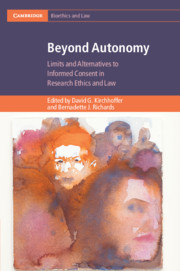
-
Select format
-
- Publisher:
- Cambridge University Press
- Publication date:
- 20 September 2019
- 03 October 2019
- ISBN:
- 9781108649247
- 9781108491907
- 9781108741309
- Dimensions:
- (228 x 152 mm)
- Weight & Pages:
- 0.46kg, 226 Pages
- Dimensions:
- (229 x 152 mm)
- Weight & Pages:
- 0.341kg, 228 Pages
You may already have access via personal or institutional login
Book description
Respect for autonomy has become a fundamental principle in human research ethics. Nonetheless, this principle and the associated process of obtaining informed consent do have limitations. This can lead to some groups, many of them vulnerable, being left understudied. This book considers these limitations and contributes through legal and philosophical analyses to the search for viable approaches to human research ethics. It explores the limitations of respect for autonomy and informed consent both in law and through the examination of cases where autonomy is lacking (infants), diminished (addicts), and compromised (low socio-economic status). It examines alternative and complementary concepts to overcome the limits of respect for autonomy, including beneficence, dignity, virtue, solidarity, non-exploitation, vulnerability and self-ownership. It takes seriously the importance of human relationality and community in qualifying, tempering and complementing autonomy to achieve the ultimate end of human research - the good of humankind.
Reviews
‘The strength of this volume is its timeliness and humanistic core, as manifested in the deep concern for the good of humankind, which must serve, the authors agree, as the goal of human research. This book is recommended for scholars and practitioners interested in bioethics, legal studies, and research methodologies and regulation.’
M. Uebel Source: Choice
Contents
Metrics
Altmetric attention score
Full text views
Full text views help Loading metrics...
Loading metrics...
* Views captured on Cambridge Core between #date#. This data will be updated every 24 hours.
Usage data cannot currently be displayed.
Accessibility standard: Unknown
Why this information is here
This section outlines the accessibility features of this content - including support for screen readers, full keyboard navigation and high-contrast display options. This may not be relevant for you.
Accessibility Information
Accessibility compliance for the PDF of this book is currently unknown and may be updated in the future.


